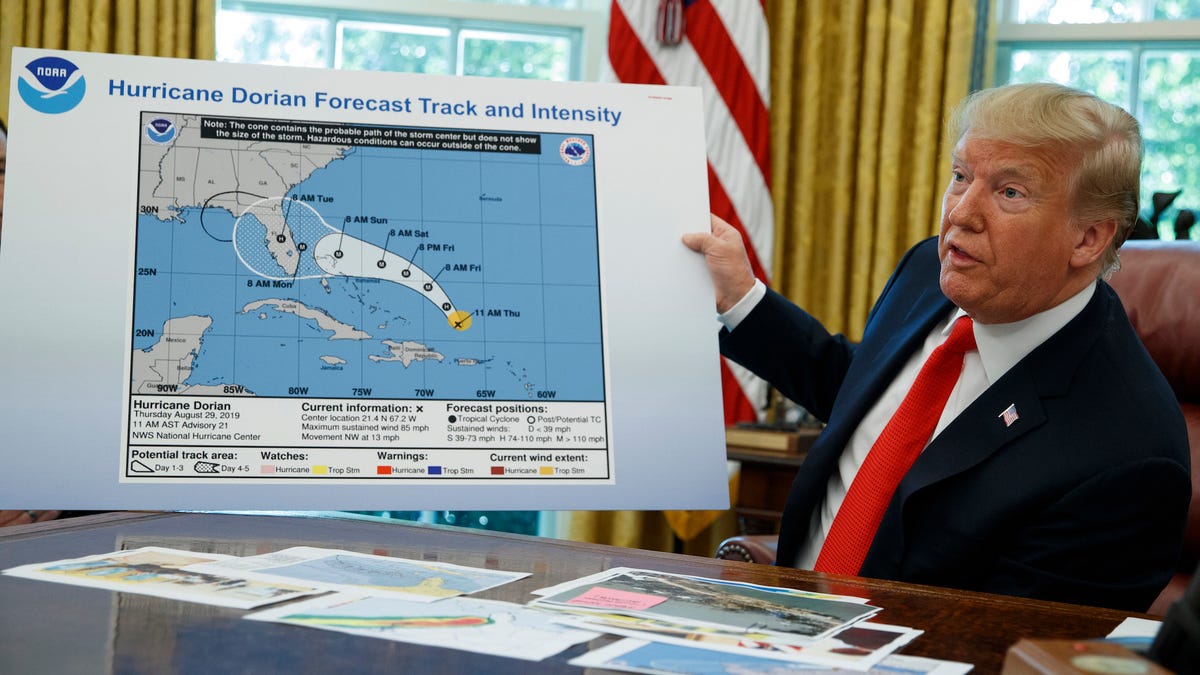“You Have No Idea How Hard I’m Fighting to Keep Politics Out of Science.” New Emails Reveal NOAA’... - 4 minutes read
 President Donald Trump showed off a Sharpie modified version of NOAA’s Hurricane Dorian forecast last year. The incident is known as “Sharpiegate.” Photo : AP
President Donald Trump showed off a Sharpie modified version of NOAA’s Hurricane Dorian forecast last year. The incident is known as “Sharpiegate.” Photo : APA new set of documents obtained by the Washington Post and other media outlets reveal the turmoil that shook the National Oceanic and Atmospheric Administration (NOAA) last September when President Donald Trump mistakenly tweeted that Hurricane Dorian posed a threat to Alabama. Dorian was not, in fact, a threat to the state, but that did not stop the president from sharing a NOAA forecast that had been modified with a sharpie to untruthfully indicate that it was.
In the days that followed, NOAA sent out an unattributed press release about the incident, colloquially known as “Sharpiegate,” that stated that the Birmingham National Weather Service, which is a part of its agency, was wrong. The Birmingham office had tweeted immediately after Trump to announce that Alabama would not see any impacts from Dorian.
Advertisement
The new documents obtained by the Post, which include various emails between top NOAA officials, demonstrate how the agency reacted internally to the incident and reveal that NOAA’s leadership believed the Birmingham office did the right thing. Additionally, the documents also highlight the struggle to keep politics from interfering with science and call attention to concerns within NOAA that Sharpiegate would discourage its workers from doing their jobs.
When it comes to the controversial press release, the emails obtained reveal that neither Tim Gallaudet, NOAA’s deputy administrator, nor Neil Jacobs, the acting NOAA administrator, approved the controversial Sharpiegate press release.
“[P]lease accept Neil’s reply as a sincere acknowledgment of a press release we did not approve or support,” Gallaudet wrote in an email to Gary Shigenaka, a NOAA marine biologist, on Sept. 8, two days after the press release was published. “You know from my multiple messages to you and your colleagues that we respect and stand behind your service and scientific integrity.”
Advertisement
The New York Times reported that the order to publish the press release came from Commerce Secretary Wilbur Ross, whose department oversees NOAA. In the report, Ross ordered NOAA chief Jacobs to back the president. When he refused, Ross threatened to fire him and other top NOAA officials.
Advertisement
Jacobs also wrote to Shigenaka about Sharpiegate and stated that the situation was “being blown way out of proportion and politicized.” Jacobs said that the Birmingham office had done to right thing in tweeting the correct forecast to calm citizens.
“You have no idea how hard I’m fighting to keep politics out of science. We are an objective science agency, and we won’t and never will base any decisions on anything other than science,” Jacobs said.
Advertisement
Other emails obtained by the Post expressed concern over the precedent set by Sharpiegate. John Murphy, the chief operating officer at the National Weather Service (NWS), emailed Jacobs and said employees were at a loss over what to do.
“Employees now fear for their jobs and are questioning whether they should post potentially life-saving info or check tweets first,” Murphy wrote on Sept. 8. “This is not good and I will reassure employees to focus on mission as I have been doing. I really hope folks can find way to let this go and our employees do not hesitate for even one second.”
Advertisement
The Dorian incident has shocked NOAA workers, shattered morale at the NWS and enraged many in the weather community. It is considered to be a press release issued under political pressure, presumably to help the president avoid admitting that he had tweeted erroneous information.
Advertisement
Sharpiegate has given way to multiple government investigations. Craig McLean, NOAA’s acting chief scientist, is currently investigating why the statement was put out and whether it violates NOAA’s scientific integrity policy. Meanwhile, the Commerce Department’s Office of the Inspector General is also analyzing the statement, contending that the circumstances have called into question the NWS’s scientific independence and ability to communicate accurately, among others.
[The Washington Post]
Source: Gizmodo.com
Powered by NewsAPI.org